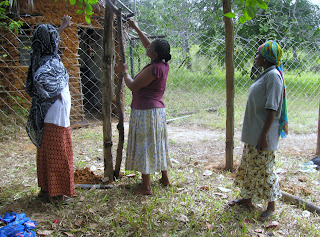 Look at our 25 new chickens! Bought from the family our one of our security guards, our new
chicks are about 8 weeks old. This
project has been a long time coming, even if we didn’t always know exactly what
it would look like.
Look at our 25 new chickens! Bought from the family our one of our security guards, our new
chicks are about 8 weeks old. This
project has been a long time coming, even if we didn’t always know exactly what
it would look like.
The EAC has always believed in building community-led
programs that are financially sustainable. This is definitely easier said than done. For the past 4 years, EAC staff,
administrators, and board members have been creating and revising a strategic
plan that pushes our programs continually towards financial
sustainability. This plan has
shifted and changed as we have tried something and succeed, or more
importantly, tried one way and failed.
But we have been continually moving forward.
One of the programs we are most proud of it our health
work. The team of 30 Community
Health Workers, in partnership with the government of Kenya, work on a
volunteer basis and have been instrumental in collecting community health data,
and spreading health messages door to door. The EAC offers them technical support, and a space to
meet. Our three paid health staff
are a part of this group, and assist the group when others have to be at
work. Having three paid staff in
this group is instrumental in the group’s success. These three staff also teach health education in 4 local
schools to Class 4 and 5, reach with over 20 community groups on a monthly
basis with economic empowerment strategies and health education, and teach
health education classes to polytechnic students, out of school youth, and
secondary school students.
For the past few years, the EAC has been raising money to
cover the salaries of these three staff members, as well as the water bill and
the security for the site. We
started to develop a way that we could invest in small, low-effort businesses,
that our health staff could run, that would bring in some income to cover some
of these operating expenses. When
Peace Corps volunteer Jill Daniels arrived in September, I tasked the her and
the health department with developing some business ideas that we could easily
implement in the space we have available and at a low cost.
 They had many ideas (some of which might be started at a
later date) but the best one was to turn the old volunteer kitchen mud hut into
a house for chickens. We used a
little bit of money to fix up the house and fence in a small yard for the
chickens, and a little bit more money to buy the 25 chicks. Some of these chickens will be ready to
sell in time for Christmas, some will hopefully be laying eggs for sale and
also so that we continually increase our chicken population. We aren’t sure how much we are
going to be making yet, but we spent about $100 to start the chicken coop, and
will sell each chicken for about $5.
It sounds like a long way to a profit, but if we become known as a place
where there are always chickens available, we should be able to sell as many as
we can produce on our property. We
are excited to see this micro-enterprise for development progress and happy to
be further along the trail of financial sustainability! Thanks to Jill Daniels and the health
team for all their hard work, and to gardener Katana Karisa for helping out
with the fence building.
They had many ideas (some of which might be started at a
later date) but the best one was to turn the old volunteer kitchen mud hut into
a house for chickens. We used a
little bit of money to fix up the house and fence in a small yard for the
chickens, and a little bit more money to buy the 25 chicks. Some of these chickens will be ready to
sell in time for Christmas, some will hopefully be laying eggs for sale and
also so that we continually increase our chicken population. We aren’t sure how much we are
going to be making yet, but we spent about $100 to start the chicken coop, and
will sell each chicken for about $5.
It sounds like a long way to a profit, but if we become known as a place
where there are always chickens available, we should be able to sell as many as
we can produce on our property. We
are excited to see this micro-enterprise for development progress and happy to
be further along the trail of financial sustainability! Thanks to Jill Daniels and the health
team for all their hard work, and to gardener Katana Karisa for helping out
with the fence building.



